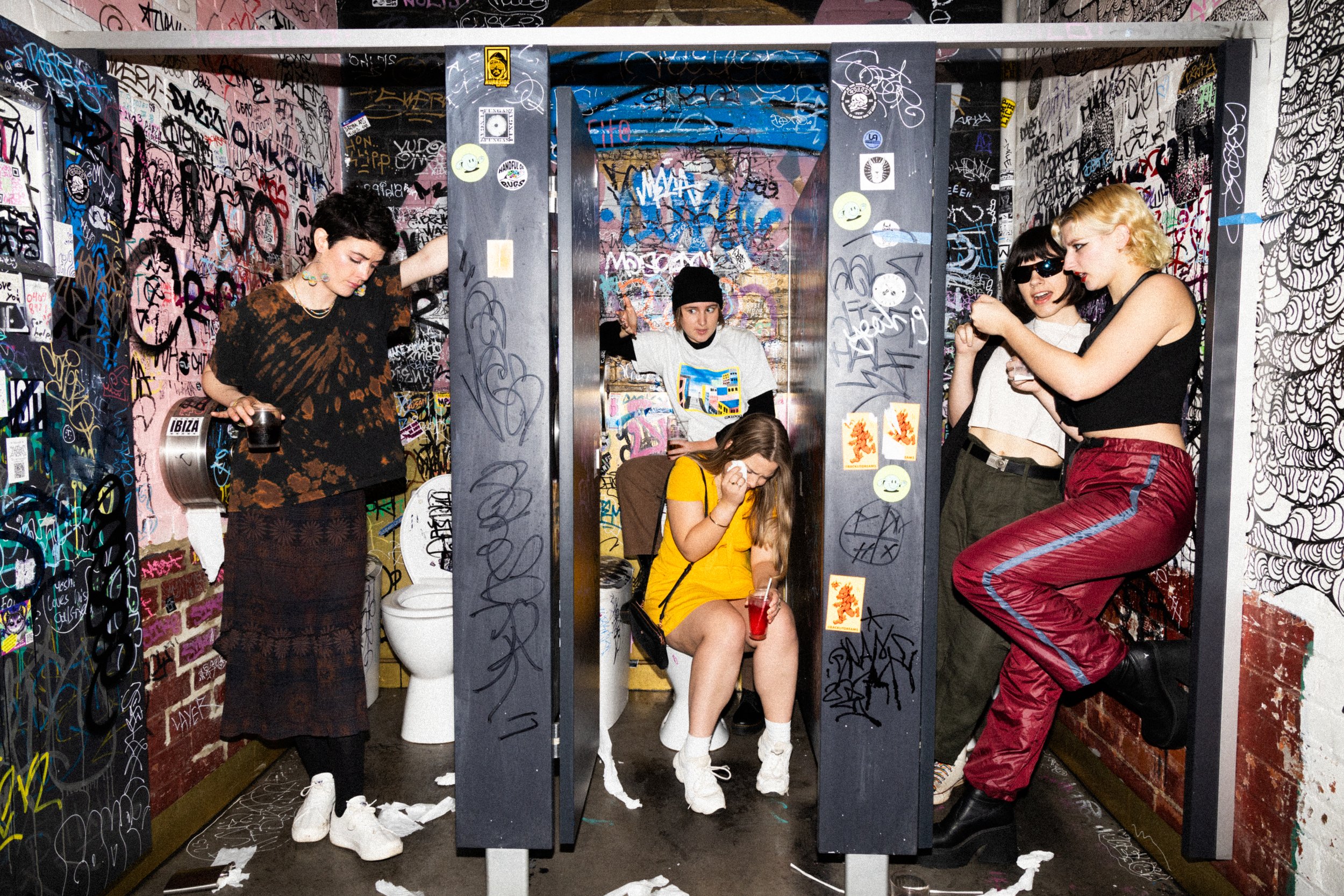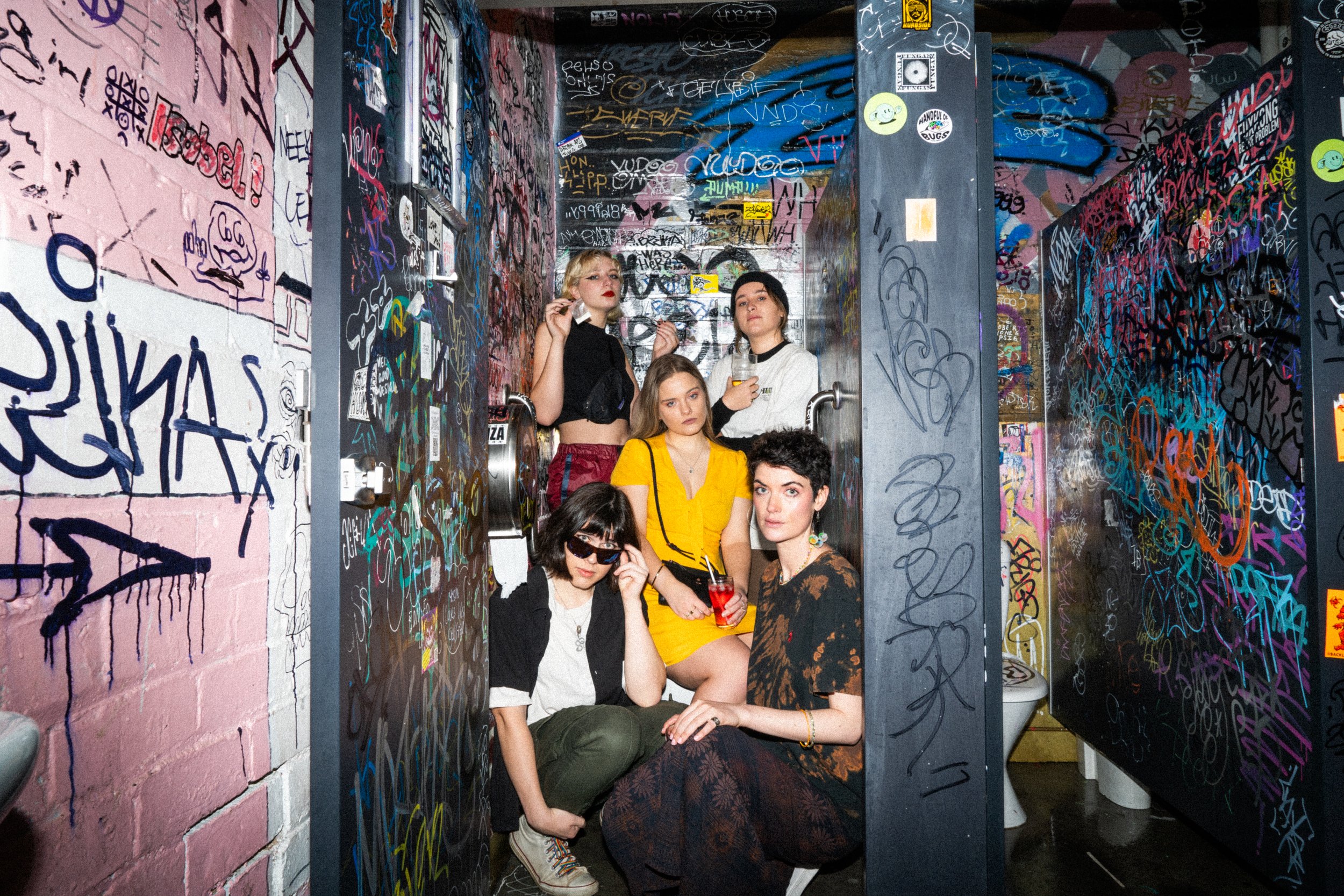Powder Room
Tuia Suter (she/they) & Bella Moretto (she/her)
Interviewed by Sarah Walliss (she/her)
Naarm

Tuia Suter and Bella Moretto are a Naarm-based creative duo. They originally connected at Victorian College of the Arts (VCA) and since have created several short films together. In August 2023, they directed and produced their first play together: Powder Room. Powder Room explores female friendship and animosity in the rawest and filthiest of locations – a nightclub women’s bathroom. It features a cast and crew of emerging creatives and addresses themes of gender, friendship and sexuality.
Images by Adam Smith
How did you get into script writing?
Bella: I was a big nerd in school and didn’t have any friends, so I just wrote scripts all the time. I thought that writing scripts would get me friends – it didn’t – but I got a lot of scripts. Embarrassingly the movie that made me go, ‘Uh, I wanna write scripts’ was The Avengers. I was like, ‘That’s it; that’s the best thing in the world’. So, I wrote comedies for my tiny group of friends and then wrote a couple movies.
Tuia: I was involved in dance and theatre when I was in school. I was part of a theatre group that tasked us with writing our own monologue at one point. Through that I realised that I wanted to write scripts. I turned away from acting and went more into writing. Then I moved down to Melbourne to study screenwriting.
Did the experience of directing a play differ from short films?
Bella: I like directing actors in the rehearsal process, which can be such a long period of time – up to three months. This sounds corny, like pretentious, but you discover the play as you’re going through it, and you learn so much about these cool, creative people. They bring their own work to it. I think short films can be go, go, go – especially when they are running on a budget. You don’t get much rehearsal time. But with a play it's more like, ‘Ok, let's sit and breathe for a minute; let's see how we go’.
How was the casting process for you?
Bella: It was much bigger than with short films. In the past, many things we’ve worked on were cast with people we know. This time we had such an array of characters that we were like, ‘Ok, let’s send out a casting call and see if we can get some people’. We weren’t expecting the amount of people that responded to respond. That gave us a great opportunity to meet all these different people and hone in on who we thought would be best for the role.
It was cool meeting all these new people. And it was daunting as well because the more people that auditioned, the more people we had to say no to; and the imposter syndrome of it all. We were like, ‘Do I deserve to say no to you?’ It was definitely interesting and rewarding.
Powder Room is set in a women’s bathroom in a nightclub. How did this concept come to you?
Tuia: I was working in a bar when I started contemplating this idea that in a bar or nightclub you have all these different people and at one point in time you’ll have four random people only centimetres apart when they go to the bathroom. And they’ll probably never get that close again. I started mixing this idea with my own stories, and stories from friends, then developing the idea into a short film. Then I brought it to Bella and said, ‘Let’s make this into a play’. Bella brought her own ideas and experiences, and we developed the characters from there.

You’ve mentioned that the play addresses female friendship and sexuality. How did you deal with the complexity of these subjects?
Bella: One of the goals we wanted to achieve was taking the idea of trope, archetypal characters we’ve seen in movies and television, like the crying girl in the bathroom stall, and then peeling back their layers to reveal that they’re actually complex humans. We wanted to talk about issues that women experience, especially in an environment that is so base-level grungy. It’s a toilet; it's where you go to pee. It's like the real base level of who you are. That’s how you learn about these people’s wide array of issues. Whether it’s relationships or drug politics, all these issues are nuanced and specific to the person.
Tuia: We focused on issues, themes and ideas that we thought were important to us and about which we had some kind of truth to say; whether that was from personal experience or experiences of people close to us. We had very truthful approaches. Also, the environment of the grungy bathroom played a key role in exploring the themes. Young people are drinking, on drugs, hormonal. The characters are in situations where they could talk about and explore these topics.
Do you have a process for writing comedy?
Bella: We’re both hesitant to call ourselves comedy writers, but that comes from years of thinking ‘We’re not that funny’. The biggest thing for me is telling a joke and getting a laugh out of the audience so they can be vulnerable to experience the more dramatic and serious parts of the story. Shows like Fleabag do this. These shows throw the ball up to make you laugh, and then hit you for six to make you cry. I think that's the most fun thing to do as a writer.
Tuia: I don’t necessarily have a process, but often I’ll be in an environment similar to the story, someone will say something funny and I’ll write it down. At some points I am literally copying down something someone said. It’s more like grabbing bits from everywhere than coming up with it organically.
Do you have advice for anyone coming up in the film or theatre industry?
Tuia: Make your stuff. Just do it. It's so fun and rewarding. So many people that we know feel held back from making their work because it often feels like there's a lot of hurdles to get over. But it's so crazy to see your own work. It's awesome.
